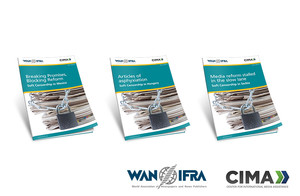This is the common conclusion of three new reports examining soft censorship practices in Hungary, Mexico and Serbia launched today by the World Association of Newspapers and News Publishers (WAN-IFRA) and the Center for International Media Assistance (CIMA) in Washington D.C.
Official soft censorship, or indirect censorship, is defined as “an array of official actions intended to influence media output, short of legal or extra-legal bans, direct censorship of specific content, or physical attacks on media outlets or media practitioners.”
Published with the support of the Open Society Foundations and research partners Mertek Media Monitor (Hungary), BIRN Serbia, and Fundar (Mexico), the three new reports provide an updated analysis of the situation as uncovered in detailed country studies conducted in 2013.
By using financial power to pressure media outlets, punish critical reporting and reward favourable coverage, biased government intervention in media sectors across the three countries not only distorts the market, but also makes it difficult for media to exercise their essential watchdog role.
“Articles of Asphyxiation: Soft Censorship in Hungary 2015 Update” shows that pressures on free and independent media in Hungary are accelerating and that the Fidesz government is enacting new and ever-broader laws and regulations that aim to control media output. The introduction of an advertising tax and other recently passed laws, together with the unfair and opaque allocation of government advertising show that intervention in the media market aggressively increased throughout 2014 and the first half of 2015.
“Media Reform Stalled in the Slow Lane: Soft Censorship in Serbia 2015 Update” highlights small improvements to the media-related legal framework in Serbia, such as thenew Law on Public Information and Media which regulates financial relations between the state and media outlets. However, as reiterated by the new report, efforts to reform legislation alone will not suffice if the Serbian government does not fully respect these regulations.Biased subsidies to media outlets, selective government advertising contracts, and manipulation regarding licensing continue to persist in the country.
“Breaking Promises, Blocking Reform: Soft Censorship in Mexico 2015 Update” (also available in Spanish) concludes that despite presidential promises, soft censorship - most conspicuously in the form of the partisan allocation of government advertising - remains a powerful impediment to a free, independent and pluralistic media in Mexico. Despite President Enrique Peña Nieto’s 2012 pledge to create a body to oversee government advertising, regulation of the sector remains weak. Lawmakers have failed to meet deadlines to establish a legal framework, while new legislation proposed by members of the Mexican Congress to regulate government advertising has not progressed. While positive developments such as a General Law on Transparency and Access to Public Government Information promises broad access to government advertising data, compliance has so far proven extremely weak.
Through more detailed research into soft censorship practices globally, WAN-IFRA and CIMA are drawing attention to the kinds of widespread and deleterious problems facing independent media that rarely generate the same level of international outrage as direct attacks on the press. The findings and recommendations of the soft censorship research series aim to contribute to the implementation of fair and transparent rules that are necessary for the development of independent media sectors around the world.
Country reports detailing soft censorship practices in Bulgaria, Macedonia and Montenegro are currently being finalised and will be published later in 2015.
WAN-IFRA also collects and regularly publishes updated information on the misuse of financial and administrative powers to manipulate reporting, which can be found - together with the soft censorship report series – online at www.softcensorship.org and on the Twitter feed @SoftCensorship. All materials are free to download and share.
WAN-IFRA, based in Paris, France, and Frankfurt, Germany, with subsidiaries in Singapore and India, is the global organisation of the world’s newspapers and news publishers. It represents more than 18,000 publications, 15,000 online sites and over 3,000 companies in more than 120 countries. Its core mission is to defend and promote press freedom, quality journalism and editorial integrity and the development of prosperous businesses.
For more information on WAN-IFRA’s press freedom activities, visit http://www.wan-ifra.org/pressfreedom
The Center for International Media Assistance (CIMA), based in Washington, D.C., raises the visibility and improves the effectiveness of media development around the world. The Center provides information, builds networks, conducts research, and highlights the indispensable role media play in the creation and development of sustainable democracies. See more at: http://cima.ned.org
Inquiries to: Andrew Heslop, Director, Press Freedom, WAN-IFRA, 96 bis, rue Beaubourg, 75003 Paris France. Tel: +33 1 47 42 85 29. Fax: +33 1 42 78 92 33. Email: andrew.heslop@wan-ifra.org




